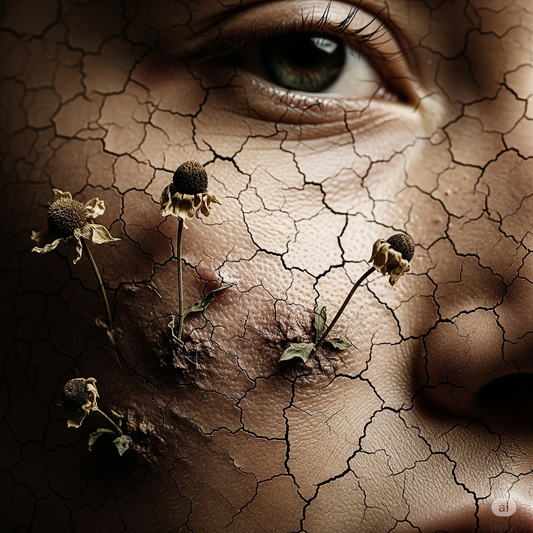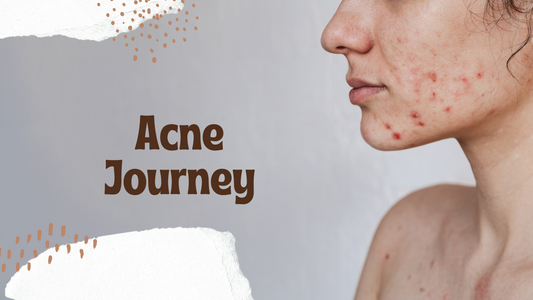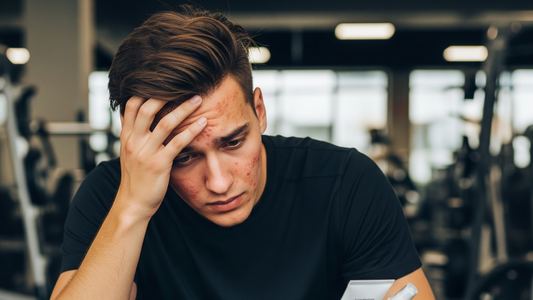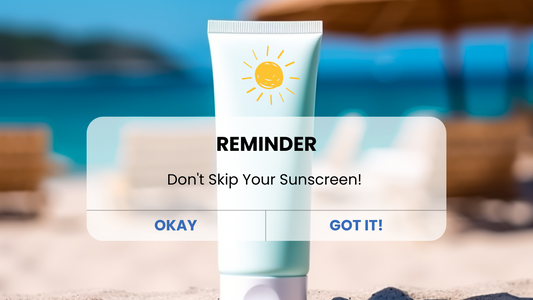Acne is an inflammatory skin disease that affects the oil glands (pores) on the skin. It is one of the most common skin disorders, impacting about 85% of individuals between the ages of 12–24¹. It persists in about 73.2% of these individuals², making it the 9th most common chronic disease in the world.
Understanding the psychosocial impact of this disease not only helps professionals empathize and communicate effectively with acne sufferers, but it also enables a more holistic approach to care, as stress, coping mechanisms, and social support directly impact disease progression and treatment adherence.
Table of Contents
Understanding Acne: Beyond the Surface
We have discussed the types of acne and why it develops here. However, it is important to address common misconceptions and societal perceptions surrounding acne. Below are a few misconceptions and their clarifications:
“I have acne because I don’t wash my skin enough.”
While some acne can be worsened by cosmetic products or oily moisturizers, this misconception may lead individuals to overwash their skin, causing irritation. If a cleanser is needed, specific cleansing instructions should be provided. It is also beneficial to explain how acne forms.
“My acne will fix itself in a few months.”
Acne can persist for years and should be treated as soon as possible to lower the risk of worsening and potential scarring. Untreated acne can lead to scars and significant psychosocial distress.
“Lemon juice or turmeric will cure my acne.”
Complementary and Alternative Medicines (CAM) like lemon juice are popular acne remedies. However, around 86% of patients using CAMs found their acne symptoms remained the same or worsened³. Most physicians do not ask patients about their CAM usage, even though some remedies may interfere with medical treatments.
Effect of Acne on Mental Health

Patients with acne often feel that their doctors underestimate the psychosocial impact of the condition on their quality of life.
Acne can lead to a range of psychosocial issues that are not necessarily correlated with its severity. These include:
Self-esteem and body image issues – Individuals may avoid eye contact, grow their hair long to cover their face, or wear heavy makeup.
Social withdrawal – Some may experience bullying, struggle to form new relationships, become shy, or develop social phobia.
Education and work challenges – Teenagers may refuse to attend school, while adults may take frequent sick days from work.
Depression and suicide risk – Acne-related distress can lead to depression, which must be recognized and treated. In severe cases, depression stemming from acne may result in suicidal thoughts⁴.
Cultural and Media Influences
Beyond acne itself, individuals also face societal pressures influenced by cultural norms and social media⁵. In several Asian countries, fair skin is often perceived as more attractive due to its association with marital and career advantages. This belief is particularly prevalent in India, Japan, Korea, China, and Thailand, where skin fairness has historically been linked to class, wealth, and social status⁶.
Coping Mechanisms and Support Systems
At Formial Labs, we actively work to be part of the solution, offering accountable, fair, scientific, and effective skincare solutions to reduce the burden of acne.
Empowering Individuals with Acne
People struggling with acne should feel empowered to seek support from professional networks and individuals who have faced similar experiences.
The Role of Skincare and Dermatological Treatments
Managing acne effectively goes beyond achieving clear skin—it directly alleviates the psychosocial challenges tied to the condition. As individuals see their skin improving, they often regain confidence, engage more in social interactions, and feel less distressed about their appearance. Personalized skincare plays a crucial role in this transformation, offering tailored solutions that address each person’s unique needs⁷.
Conclusion
Acne has a significant psychosocial impact, which must not be overlooked. Individuals need personalized, scientific, effective, and empathetic skincare to alleviate these struggles and minimize unnecessary suffering.
At Formial Labs, we are committed to providing the highest quality of care and supporting our users in their skincare journey. Because a complex problem requires an adaptable solution, a one-size-fits-all approach does not work.
Frequently Asked Questions
Acne's impact on mental health can be significant. Beyond physical discomfort, it often triggers emotional distress. The visibility of acne can lead to feelings of self-consciousness, shame, and embarrassment, particularly in social situations. This can contribute to social anxiety and isolation, as individuals may avoid interactions due to fear of judgment. Low self-esteem and body image issues are common, impacting overall confidence. Furthermore, the persistent nature of acne can cause frustration and feelings of helplessness, potentially leading to increased stress and even depression. The emotional burden of acne should not be underestimated, as it can profoundly affect one's quality of life.
While occasional, minor breakouts might resolve on their own, consistently ignoring acne is generally not advisable. Untreated acne can lead to several complications, including the development of permanent scarring, which can significantly impact skin texture and appearance. Furthermore, persistent acne can contribute to ongoing emotional distress, affecting self-esteem and social interactions. Even seemingly mild acne can worsen over time if left unchecked, potentially leading to more severe forms that require more intensive treatment. Addressing acne proactively can prevent these issues, promote healthier skin, and improve overall well-being.
Acne's severity varies, but it's more than just a cosmetic issue. While mild cases might seem insignificant, persistent or severe acne can significantly impact one's quality of life. Beyond physical discomfort, it can lead to permanent scarring, affecting skin texture and appearance. Psychologically, acne can trigger self-consciousness, social anxiety, and even depression. In severe cases, it can cause painful cysts and nodules, requiring medical intervention. Untreated acne can worsen, leading to more extensive scarring and emotional distress. Therefore, while not always life-threatening, acne is a serious problem that should be addressed to prevent long-term physical and emotional consequences.
Glossary
Psychosocial Impact: Refers to the combined psychological and social effects that a condition (such as acne) can have on an individual’s well-being.
Complementary and Alternative Medicines (CAM): A diverse group of medical and health care practices, products, and systems not traditionally part of conventional medicine, often used alongside standard treatments.
Social Phobia: An anxiety disorder characterized by an intense fear of social situations and being negatively judged by others.
Holistic Approach: A method of care that considers the whole person—physical, mental, and social factors—rather than just addressing specific symptoms.
References:
1. Griffiths C, Barker J, Bleiker T, Hussain W, Simpson RC, editors. Rook’s textbook of dermatology. Tenth edition. Hoboken, NJ: Wiley-Blackwell; 2024.
2. Dhoot D, Budamakuntla L, Parasramani S, Deshmukh G, Barkate H. Acne in Indian population: An epidemiological study evaluating multiple factors. IP Indian J Clin Exp Dermatol. 2020 Oct 28;6(3):237–42.
3. Conforti C, Giuffrida R, Fadda S, Fai A, Romita P, Zalaudek I, et al. Topical dermocosmetics and acne vulgaris. Dermatol Ther [Internet]. 2021 Jan [cited 2024 Dec 6];34(1). Available from: https://onlinelibrary.wiley.com/doi/10.1111/dth.14436
4. Zhou C, Vempati A, Tam C, Khong J, Vasilev R, Tam K, et al. Beyond the Surface: A Deeper Look at the Psychosocial Impacts of Acne Scarring. Clin Cosmet Investig Dermatol. 2023 Mar;Volume 16:731–8.
5. Kayıran MA, Karadağ AS, Alyamaç G, Cemil BÇ, Demirseren DD, Demircan YT, et al. Use of Complementary and Alternative Medicine among Patients with Acne Vulgaris and Factors Perceived to Trigger the Disease: A Multicentre Cross-Sectional Study with 1571 Patients. Indian J Dermatol. 2022 May;67(3):311.
6. Özkesici Kurt B. Comparison of the psychosocial impact of acne in adolescents and adults; body satisfaction, self-esteem, and quality of life. J Cosmet Dermatol. 2022 Feb;21(2):836–43.
7. Marron SE, Chernyshov PV, Tomas-Aragones L. Quality-of-Life Research in Acne Vulgaris: Current Status and Future Directions. Am J Clin Dermatol. 2019 Aug;20(4):527–38.
8. Sanzari CM, Gorrell S, Anderson LM, Reilly EE, Niemiec MA, Orloff NC, et al. The impact of social media use on body image and disordered eating behaviors: Content matters more than duration of exposure. Eat Behav. 2023 Apr;49:101722.
9. Shroff H, Diedrichs PC, Craddock N. Skin Color, Cultural Capital, and Beauty Products: An Investigation of the Use of Skin Fairness Products in Mumbai, India. Front Public Health. 2017;5:365.
10. Layton AM, Alexis A, Baldwin H, Bettoli V, Del Rosso J, Dirschka T, et al. The Personalized Acne Treatment Tool - Recommendations to facilitate a patient-centered approach to acne management from the Personalizing Acne: Consensus of Experts. JAAD Int. 2023 Sep;12:60–9.





